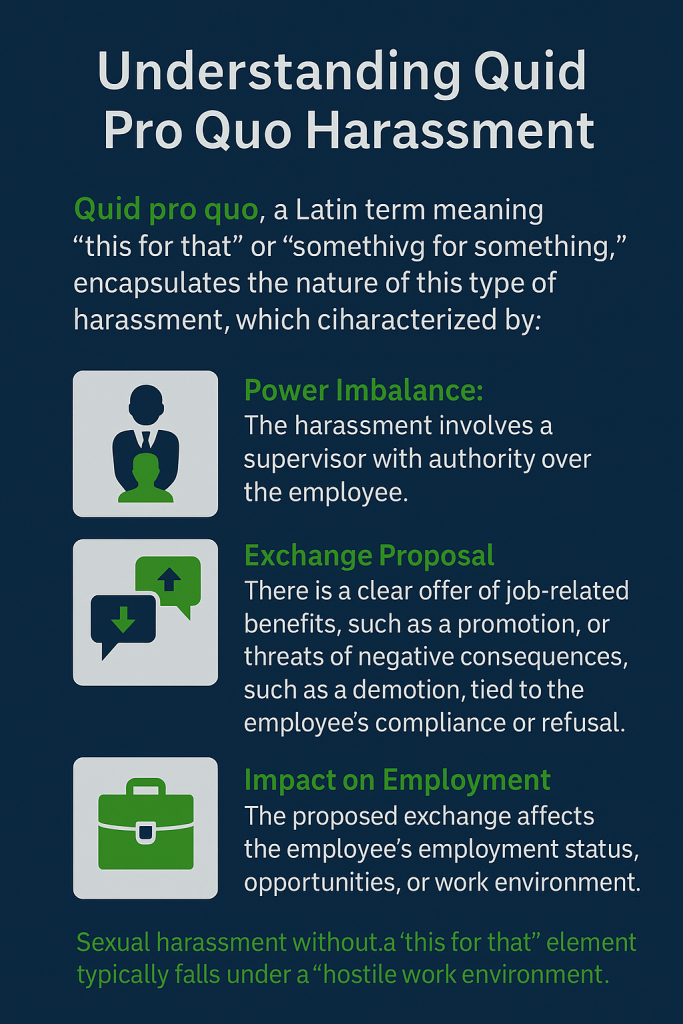Quid pro quo is a form of harassment that occurs when someone in a position of authority, for example, your supervisor, demands sexual favors in exchange for workplace privileges such as a pay raise, a promotion, or more flexible hours. The imbalance of power restricts your ability to say no. Harassment is a form of employment discrimination that violates Title V11 of the Civil Rights Act of 1964, the Age Discrimination in Employment Act of 1967, and the Americans with Disabilities Act of 1990 (ADA), when the harassment is because of your inclusion in a protected category.
At The Noble Law, an experienced workplace harassment attorney is here to listen to your story, help you understand your options, and provide you with the strong advocacy you need to prevail. If you have suffered sexual assault, quid pro quo, or any other form of harassment in the workplace, we want to help. For those in North Carolina and South Carolina, The Noble Law is ready to advocate for your rights. We believe you.
Understanding Quid Pro Quo Harassment
Quid pro quo, a Latin term meaning “this for that” or “something for something,” encapsulates the nature of this type of harassment, which is characterized by:
- Power Imbalance: The harassment involves a supervisor with authority over the employee.
- Exchange Proposal: There is a clear offer of job-related benefits, such as a promotion, or threats of negative consequences, such as a demotion, tied to the employee’s compliance or refusal.
- Impact on Employment: The proposed exchange affects the employee’s employment status, opportunities, or work environment.
Sexual harassment without a “this for that” element typically falls under a “hostile work environment.”
Examples of Quid Pro Quo Harassment in the Workplace
Recognizing quid pro quo harassment can be challenging, especially when the requests or demands are subtle. Examples include the following:
Promotion Promises
You work hard and hope for a promotion. Your immediate supervisor calls you into their office and subtly hints that they’ll put in a good word for you if you have a drink with them after work. This promise of a promotion in exchange for an intimate encounter is a classic example of quid pro quo harassment.
Withholding Annual Raises
You are looking forward to your annual raise. Your supervisor implies that spending personal time together could improve the amount of your raise. The implication is clear: comply with their wishes, and you will see a significant bump in your paycheck.
Third-party Quid Pro Quo
With third-party quid pro quo harassment, your immediate supervisor is not suggesting sexual favors for themselves but for a client or customer, with negative consequences if you decline to flirt, kiss, or engage in other sexually suggestive behaviors.
Promise of Favorable Work Conditions
Sometimes, supervisors offer improved work conditions—flexible hours, a better office space, or enhanced job perks—with the expectation that you will comply with their “requests,” which become a coercive tool in quid pro quo harassment.
In each scenario, quid pro quo harassment involves exploiting the imbalance of power to demand sexual favors in exchange for job benefits or to avoid negative repercussions.
Steps to Take
Here are some practical steps you can take if a manager or supervisor has engaged in quid pro quo harassment:
Document the Incident: Keep a detailed record, including dates, times, locations, and descriptions of the requests or behavior. Save any relevant emails, messages, or other evidence.
Follow Your Company’s Policy: Inform your HR department or follow established internal procedures for reporting harassment. You can also contact the Equal Employment Opportunity Commission (EEOC) or, if you are in South Carolina, the South Carolina Human Affairs Commission (SCHAC).
Seek Legal Advice: If internal channels do not resolve the issue or if you fear retaliation, consider consulting with an employment lawyer. Our experienced attorneys can help you understand your rights, collect evidence, and guide you through filing complaints and pursuing legal action if necessary.
Your Trusted Counsel for Workplace Disputes
Quid pro quo harassment can have serious consequences, including emotional and psychological distress, career setbacks, and a toxic work environment. You deserve a safe workplace, and our employment law firm is here to help advocate for you, restore your dignity, defend your compensation, and move toward closure.
If you are suffering from workplace harassment, schedule a consultation with one of our sexual harassment lawyers in North Carolina or South Carolina. At The Noble Law, we share your goals: to affirm your dignity and obtain the compensation you deserve.
About The Noble Law Firm
The Noble Law is a women-owned employment law firm with offices in North Carolina and South Carolina, founded by Laura Noble in 2009. Specializing in wrongful termination, workplace harassment, workplace retaliation, workplace mediation, and neutral third-party investigations, the firm is committed to leveling the playing field for employees. Their focus is on delivering positive outcomes with empathy and integrity, while also driving societal change in employment law.
The firm emphasizes diversity, collaboration, and innovation, fostering a balanced work environment that values the personal lives of its staff. With a strong commitment to technology and efficiency, The Noble Law provides personalized attention to a select group of clients, handling cases involving harassment, discrimination, retaliation, and more. The team’s extensive litigation experience allows them to deliver thorough and assertive representation.


